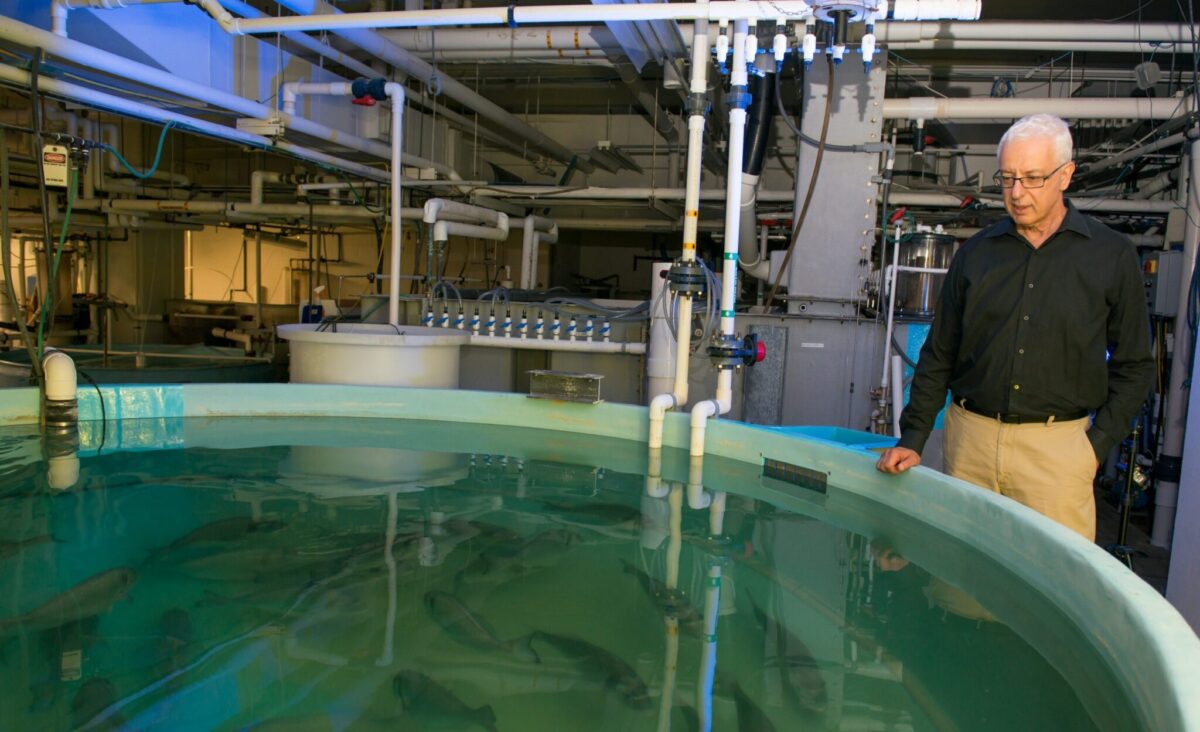Yonathan Zohar, professor of marine biotechnology, has received the Lifetime Achievement Award from the International Society for Fish Endocrinology. Zohar’s work at the Institute of Marine and Environmental Technology in Baltimore’s Inner Harbor has produced fundamental discoveries in fish reproductive biology and applied the findings to the aquaculture industry, resulting in major advances. In 2020, the Binational Agricultural Research Development (BARD) Fund, a partnership program between the U.S. and Israel, also recognized Zohar for the outsize economic impact of his research.
In addition to Zohar’s core work in fish reproductive physiology, he has led a decades-long effort to develop land-based aquaculture methods that could bring fresh seafood to inland areas of the United States. Land-based fish production operations avoid pitfalls of open-water aquaculture such as disease, polluted water, and escapes. Land-based aquaculture could also limit the need for long-distance seafood transportation.
Maryland Farm and Harvest on Maryland Public Television (MPT) recently featured Zohar and his colleagues’ work. The aquaculture industry is the world’s fastest growing sector of agriculture, Zohar told MPT. American demand for seafood is rising, and currently, most of it is imported. With a $10 million grant from the USDA, Zohar has been working with team of scientists and government and industry stakeholders from the U.S. and abroad to help move land-based aquaculture toward commercial viability.
“We here at IMET, at the Aquaculture Research Center [ARC], are trying to address all these challenges, bottlenecks, hurdles to this industry so it can become economically feasible as well as—obviously as much as possible—environmentally responsible,” Zohar told MPT.

Addressing aquaculture’s hurdles
One of those hurdles is figuring out how to bring salmon to market size year round. Typically, salmon only reproduce once per year, Zohar explained. “We are using environmental manipulation to phase shift—to change the time of the spawning of the fish—so the farmer can get good quality eggs all year round,” he said. The team at the ARC has had success spawning salmon six months after their typical spawning time, Zohar told MPT, as a tray of red-orange salmon eggs spawned at IMET showed on the screen. And “if you can do it six months, you can do it four months, three months, all year round,” he said.
Another challenge to land-based systems is the accumulation of sludge—otherwise known as fish poop—in the tanks. Kevin Sowers, professor of marine biotechnology and a microbiology expert, explained that as the water in the fish tanks passes through a filter to be reused, bacterial colonies living on the surface of what look like pieces of wheel-shaped pasta break down the sludge. One of the products is methane gas.
“The goal here is to get rid of that waste, reduce it, and turn it into a product that can be used,” Sowers said. “And the product we produce, the biogas, will actually help power about 10 percent of the energy costs here in the facility.”
Still swimming along
All of these advances represent years or decades of effort by Zohar, Sowers, and additional colleagues to first understand the fundamentals of fish biology and reproduction, and then to find ways of tweaking it that serve the aquaculture industry and address the rising consumer demand for fish.
Zohar may have been doing this for a while, but with the industry on what feels like the cusp of a breakthrough, his continued enthusiasm for his work was obvious on Maryland Farm and Harvest.
“For someone who has been working on aquaculture for over 40 years, well, I have a lot of energy still to make sure that we make this happen,” Zohar told MPT—“that we stop overfishing our oceans and we satisfy the increasing demand of seafood in the United States and in the world.”
Tags: CNMS, MarineBiotech, Research

